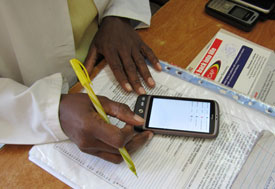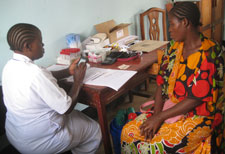Electronic protocols improve child health in Tanzania
January / February 2012 | Volume 11, Issue 1

Photo courtesy of Dr. Marc Mitchell
A study in Tanzania has shown when health care
workers use electronic versus printed protocols they
are more likely to appropriately diagnose, treat and
refer their patients.
In low-income countries like Tanzania, the survival of a sick child can sometimes hinge on something as simple as a health worker going through the pages of a manual. Fogarty grantee Dr. Marc Mitchell is working to replace paper-based medical protocols with a more effective format based on mobile health technology. A pediatrician and management specialist, Mitchell is president of D-tree International, a nongovernmental organization that provides decision trees, algorithms and evidence-based medicine to health workers.
D-tree's work in Tanzania, supported by grants from NIH, WHO and the Rockefeller Foundation, has been focused on improving standards of care known as Integrated Management of Childhood Illness protocols, or IMCI. Providing detailed and methodical instructions, they enable health workers to appropriately diagnose, treat and refer their patients. According to Mitchell, paper versions of IMCI are often followed inaccurately or are not consulted at all. "I don't know of any health worker who goes through a book in front of a patient to figure out what's wrong. It makes the patient uncomfortable," he said. "The problem is that these protocols that have been made very thoroughly available - and when used correctly work well - mostly aren't used correctly."
To address these issues, Mitchell and his team developed a mobile health version of IMCI that functions on cellphones. Like their paper cousins, the electronic protocols offer clinicians step-by-step instructions for a wide range of childhood medical conditions. It's less expensive to make changes to the new system, however, and less time-consuming to train health workers to use it. "On average, it took approximately an hour to train health workers who were already familiar with the protocols to use them on the phone," Mitchell said.

Photo courtesy of Dr. Marc Mitchell
Health care workers are not as likely to
consult printed materials in front of patients
but mobile versions can help ensure they
follow established step-by-step instructions.
To validate the effectiveness of their design and provide an evidence base for their program, the researchers conducted a randomized control trial at 18 rural health centers in one region of Tanzania. Observers were assigned to check how well each health worker followed both paper and electronic protocols when treating children, while also measuring the frequency of correct diagnosis. To track the diagnoses, each child examined in the study was re-examined by an IMCI expert to evaluate the decision reached by the health worker.
The study showed that the health workers' adherence to IMCI was improved using the cellphone-based program, with increases of more than 30 percent in some cases. "We understand that in both cases they probably did better because of the observer effect, but still we saw this difference," said Mitchell. Similarly, correct diagnoses were reached more frequently when the electronic protocols were used instead of the paper versions. "It was especially true with those children who were most severely ill," he said. "These are the kids that it's particularly important that you get the right diagnosis, and if it's severe, that sets them up for more rigorous treatment and more rapid referral to a hospital where someone can treat their severe illness."
Mitchell's Fogarty-funded project is also being carried out in Tanzania and aims to enhance the electronic version of IMCI by adding a module for patient and caretaker adherence to the protocols.
More Information
To view Adobe PDF files,
download current, free accessible plug-ins from Adobe's website.